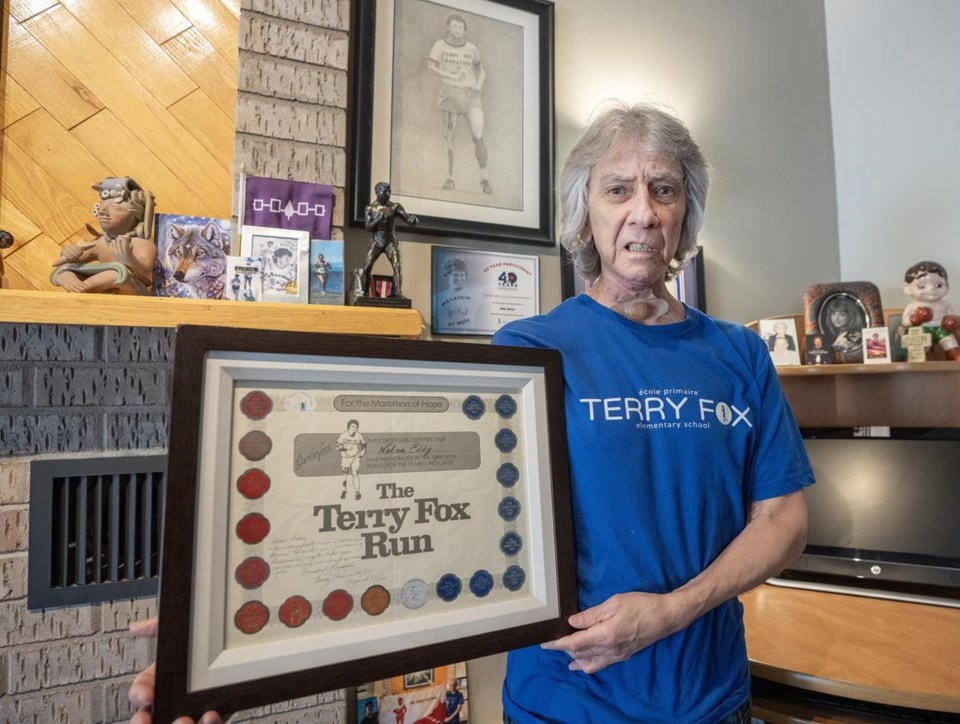MONTREAL — Every year for 43 years, Montrealer Eddy Nolan took to the streets for a Terry Fox Run, usually carrying a big red and white Terry Fox flag on a pole as packs of schoolchildren jogged behind him.
This year, at age 67, Nolan decided he could not run anymore.
On Friday — the anniversary of the day Fox began his cross-country Marathon of Hope for cancer research in 1980 — the longtime marathon runner and Terry Fox advocate chose to end his life through medical assistance in dying. Complications from cancer treatment had robbed him of his quality of life, he said in an interview days before his death.
"I made 43 years, right to the end," Nolan said Tuesday in his suburban Montreal home. The April 12 anniversary seemed a fitting time, knowing children would be out that day running in tribute to Fox. "I said, 'It’s the perfect day for me.'"
Nolan was born in Pointe-St-Charles — a hardscrabble neighbourhood in south Montreal with deep Irish roots. He grew up tough, leaving home at 16 and learning to box well enough to win five Golden Glove championships.
At age 22, he decided to train for his first marathon, and he found it hard. Then one night, he turned on the news and saw coverage of Terry Fox's run. He was blown away.
While Nolan had been complaining about his own gruelling training, here was Fox running the distance of a full marathon every day on a single leg, after losing the other to cancer. Here was Fox, his eyes filled with pain and determination, half-hopping, half-running across Canada on a prosthetic leg, trying to help sick kids.
"That's a hero to me," Nolan said this week.
Like many Canadians, Nolan became captivated by Fox's journey. And after Fox succumbed to cancer at age 22, Nolan was on the start line when the first Terry Fox run was held in his honour in 1981.
Over the years, Nolan retraced some of Fox's steps, including running around the track where he trained in British Columbia and visiting the hotel where Fox stayed near Thunder Bay, Ont., when his Marathon of Hope was cut short by cancer's return.
The home Nolan shared with his longtime partner Mary and their dog is a testament to his lifetime commitment to honouring Fox's legacy. There is a certificate from that first Terry Fox run, pictures signed by Fox's family and friends, and paintings, drawings and banners.
But the home is also evidence of Nolan's own legacy. On the walls and in drawers are dozens of hand-drawn cards and messages from the elementary schoolchildren he met in his long career at the English Montreal School Board as a caretaker and, increasingly, as an educator and advocate for Terry Fox.
Each year he would lead the kids on the annual school Terry Fox Run, with chants of "Ed-dy!," "Ed-dy!" ringing out as he started the first lap. He became a fixture on the local news, even though he kept trying to get them to turn their cameras to the students.
"To me, it was always about the children," he said.
Over the years, Nolan racked up an impressive athletic record, completing 65 full marathons. He also helped raise an estimated $1 million for cancer in Fox's name.
Roslyn elementary school, where Nolan worked for 13 years, organized a walk in his honour Friday. "Terry Fox inspired Eddy, and in turn, he inspired us," said former Roslyn principal Nick Katalifos.
This week, Terry Fox foundation executive director Michael Mazza praised Nolan's "remarkable" impact on cancer research in Canada, writing, "we will be forever grateful to Eddy for his generous spirit and incredible support, and we will miss him dearly."
In 2011, Nolan's health began to fail when, like his hero, he was diagnosed with cancer.
After his treatment for throat and neck cancer, he threw out all his painkillers, and returned to the treadmill. Soon after, he entered a marathon in Washington, D.C., which he completed in just under four hours with a hernia belt and a feeding tube.
"I had to see what cancer had taken from me," he said.
But in recent years, Nolan's health problems piled up. While he was free of cancer, the radiation had left so much scar tissue he was unable to feel his face, and it led to him experiencing shooting pain down his arms. A recent throat surgery left him unable to breathe through his nose or mouth, and he talked in a raspy growl through a hole in his throat. The lifelong runner was suddenly unsteady on his feet, and sometimes fell.
Nolan inquired about medical assistance in dying last October,and doctors confirmed he was eligible. When asked during his final days whether he was comfortable with his decision, he said it was hard because "nobody in their right mind wants to die." But while his mind was as sharp as ever, his body was failing. "I want to go with my dignity intact," he said.
While he admitted to being nervous, even a little afraid, he said he was clinging to a quote of Terry Fox's that he had tattooed on his calf, below a large image of his hero running.
It read: "Somewhere, the hurting must stop."
This report by The Canadian Press was first published April 13, 2024.
Morgan Lowrie, The Canadian Press




